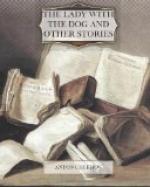“I stand upright; you lie down right; he lies all right,” said Ivan Petrovitch as he put his daughter into the carriage.
They drove off.
“I was at the cemetery yesterday,” Startsev began. “How ungenerous and merciless it was on your part! . . .”
“You went to the cemetery?”
“Yes, I went there and waited almost till two o’clock. I suffered . . .”
“Well, suffer, if you cannot understand a joke.”
Ekaterina Ivanovna, pleased at having so cleverly taken in a man who was in love with her, and at being the object of such intense love, burst out laughing and suddenly uttered a shriek of terror, for, at that very minute, the horses turned sharply in at the gate of the club, and the carriage almost tilted over. Startsev put his arm round Ekaterina Ivanovna’s waist; in her fright she nestled up to him, and he could not restrain himself, and passionately kissed her on the lips and on the chin, and hugged her more tightly.
“That’s enough,” she said drily.
And a minute later she was not in the carriage, and a policeman near the lighted entrance of the club shouted in a detestable voice to Panteleimon:
“What are you stopping for, you crow? Drive on.”
Startsev drove home, but soon afterwards returned. Attired in another man’s dress suit and a stiff white tie which kept sawing at his neck and trying to slip away from the collar, he was sitting at midnight in the club drawing-room, and was saying with enthusiasm to Ekaterina Ivanovna.
“Ah, how little people know who have never loved! It seems to me that no one has ever yet written of love truly, and I doubt whether this tender, joyful, agonising feeling can be described, and any one who has once experienced it would not attempt to put it into words. What is the use of preliminaries and introductions? What is the use of unnecessary fine words? My love is immeasurable. I beg, I beseech you,” Startsev brought out at last, “be my wife!”
“Dmitri Ionitch,” said Ekaterina Ivanovna, with a very grave face, after a moment’s thought—“Dmitri Ionitch, I am very grateful to you for the honour. I respect you, but . . .” she got up and continued standing, “but, forgive me, I cannot be your wife. Let us talk seriously. Dmitri Ionitch, you know I love art beyond everything in life. I adore music; I love it frantically; I have dedicated my whole life to it. I want to be an artist; I want fame, success, freedom, and you want me to go on living in this town, to go on living this empty, useless life, which has become insufferable to me. To become a wife—oh, no, forgive me! One must strive towards a lofty, glorious goal, and married life would put me in bondage for ever. Dmitri Ionitch” (she faintly smiled as she pronounced his name; she thought of “Alexey Feofilaktitch")—“Dmitri Ionitch, you are a good, clever, honourable man; you are better than any one. . . .” Tears came into her eyes. “I feel for you with my whole heart, but . . . but you will understand. . . .”




